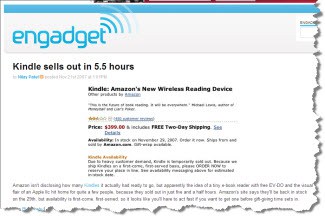Online retailers are missing a trick if they don’t have products which are “sold out” from time to time. That’s the conclusion of research from the University of Alberta which looked at buyer behaviour when a product was not available. Traditional wisdom is that the lack of availability of a product online is perceived as negative; but, as ever, it is not as simple as that.
 If your website shows products as being “out of stock”, the popular theory is that people will perceive your shop negatively because you have poor stock control. But if you show “sold out” instead of “out of stock” you can turn this into a real positive – and make more money – this latest research suggests.
If your website shows products as being “out of stock”, the popular theory is that people will perceive your shop negatively because you have poor stock control. But if you show “sold out” instead of “out of stock” you can turn this into a real positive – and make more money – this latest research suggests.
The study looked at a couple of scenarios, one on ski-passes and the other on wine. In both instances the presence of a “sold out” sign for one item actually encouraged people to buy a similar item. According to the researchers the “sold out” sign prompted the sense of urgency in the buyers. They wanted to get their hands as quickly as possible on the similar item, before that too sold out.
So how can you use this in your online business? The answer is to restrict the availability of a product which has alternative or similar products available on your website. For example, say you have two ebooks available. One you restrict to, say, 1,000 downloads. Then once that has happened you show the product as “sold out” – but highlight the availability of the alternative ebook. More people will buy the alternative, this research suggests.
However, importantly, the study shows that the urgency to purchase created by the “sold out” sign only applies to new products. If you have sold out old or established items, consumers put this down to poor stock management and don’t make extra purchases – they see your business negatively because you are unable to control stock. With new products, they surmise that you didn’t really know the demand and therefore being “out of stock” is allowable.
It also helps in another aspect of this phenomenon, the researchers say. It helps in something called the “information cascades effect”. This is where people start telling others that your product is so “hot” it has sold out and they’d better get their skates on to get the alternative before that too sells out. In other words the lack of availability of a new product stimulates the sales of your alternatives. Think Apple Inc. They create huge demand for the brand new iPhone, which sells out quickly, only to see more people buying the older, established product. They might want the “new thing” but if people can’t get it they’ll settle for the older version – even if previously they hadn’t intended to buy it. Selling out, clearly creates additional demand for products.
